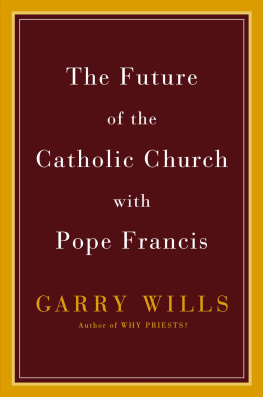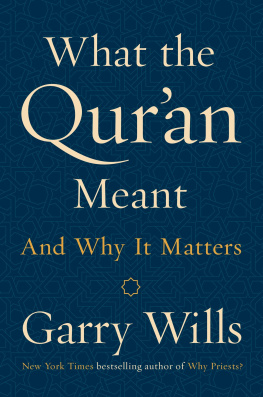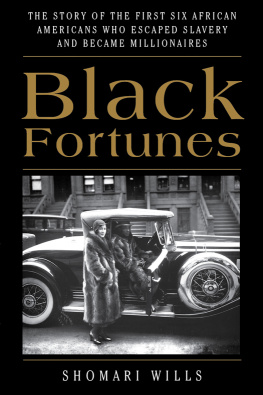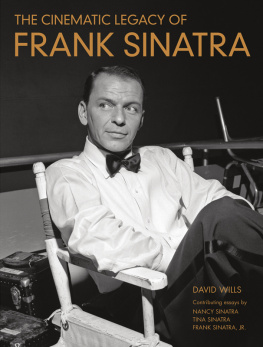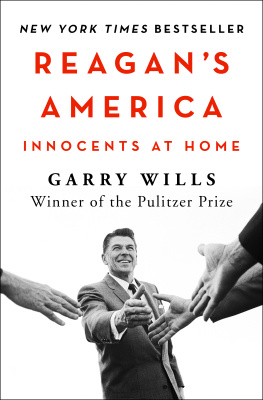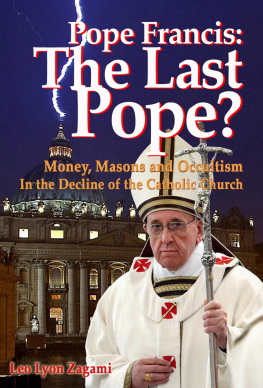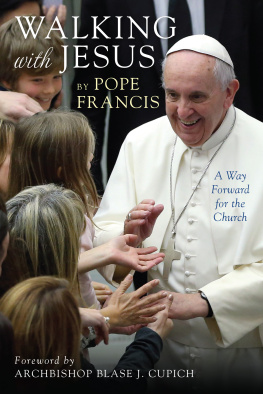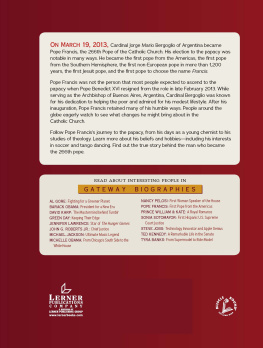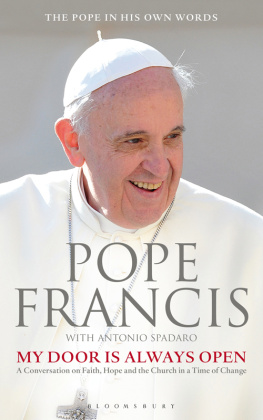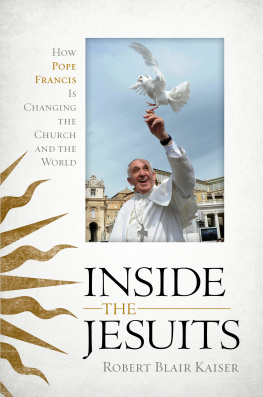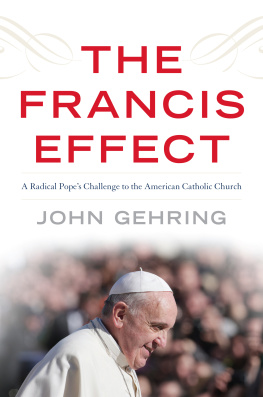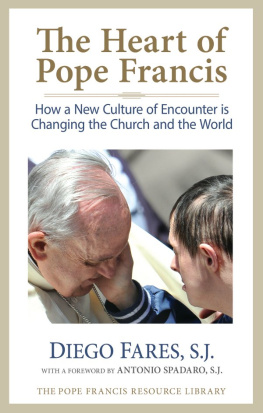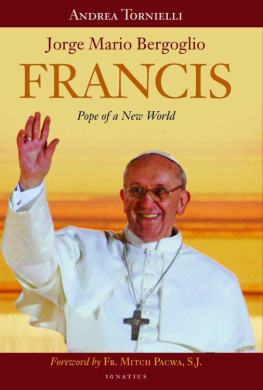Wills - The Future of the Catholic Church with Pope Francis
Here you can read online Wills - The Future of the Catholic Church with Pope Francis full text of the book (entire story) in english for free. Download pdf and epub, get meaning, cover and reviews about this ebook. year: 2015, publisher: Penguin, genre: Religion. Description of the work, (preface) as well as reviews are available. Best literature library LitArk.com created for fans of good reading and offers a wide selection of genres:
Romance novel
Science fiction
Adventure
Detective
Science
History
Home and family
Prose
Art
Politics
Computer
Non-fiction
Religion
Business
Children
Humor
Choose a favorite category and find really read worthwhile books. Enjoy immersion in the world of imagination, feel the emotions of the characters or learn something new for yourself, make an fascinating discovery.
The Future of the Catholic Church with Pope Francis: summary, description and annotation
We offer to read an annotation, description, summary or preface (depends on what the author of the book "The Future of the Catholic Church with Pope Francis" wrote himself). If you haven't found the necessary information about the book — write in the comments, we will try to find it.
The Future of the Catholic Church with Pope Francis — read online for free the complete book (whole text) full work
Below is the text of the book, divided by pages. System saving the place of the last page read, allows you to conveniently read the book "The Future of the Catholic Church with Pope Francis" online for free, without having to search again every time where you left off. Put a bookmark, and you can go to the page where you finished reading at any time.
Font size:
Interval:
Bookmark:

ALSO BY GARRY WILLS
Why Priests?
Verdis Shakespeare
Outside Looking In
Bomb Power
Martials Epigrams
What the Gospels Meant
Head and Heart
What Paul Meant
What Jesus Meant
The Rosary
Why I Am a Catholic
Saint Augustines Confessions
(Translation)
Papal Sin: Structures of Deceit
Saint Augustine
(A Penguin Lives Biography)
Lincoln at Gettysburg:
The Words That Remade America
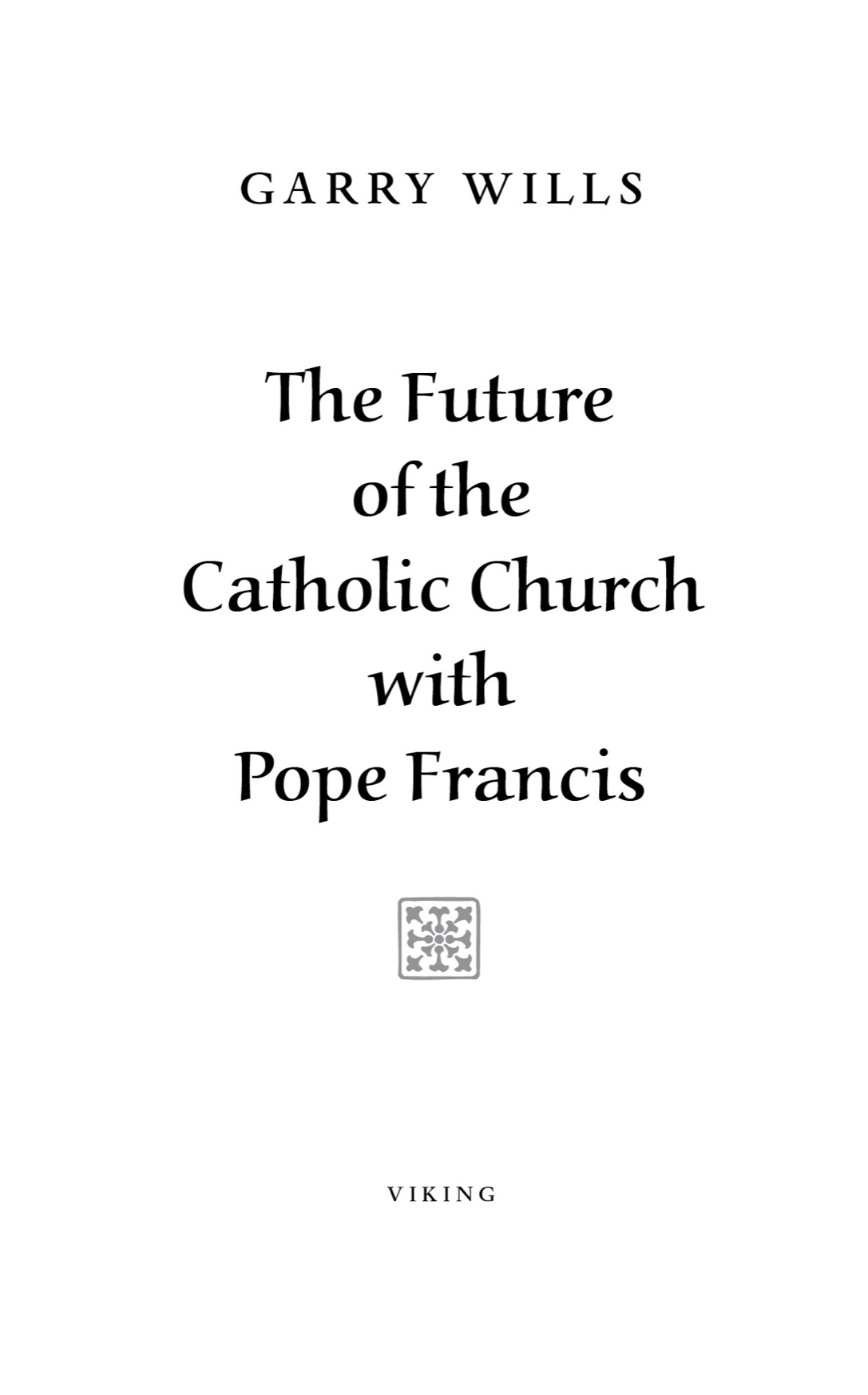
VIKING
Published by the Penguin Group
Penguin Group (USA) LLC
375 Hudson Street
New York, New York 10014

USA | Canada | UK | Ireland | Australia | New Zealand | India | South Africa | China
penguin.com
A Penguin Random House Company
First published by Viking Penguin, a member of Penguin Group (USA) LLC, 2015
Copyright 2015 by Garry Wills
Penguin supports copyright. Copyright fuels creativity, encourages diverse voices, promotes free speech, and creates a vibrant culture. Thank you for buying an authorized edition of this book and for complying with copyright laws by not reproducing, scanning, or distributing any part of it in any form without permission. You are supporting writers and allowing Penguin to continue to publish books for every reader.
Grateful acknowledgment is made for permission to reprint an excerpt from Autumn Journal by Louis MacNeice (Faber and Faber). Used by permission of David Higham Associates.
ISBN 978-0-698-15765-1
Version_1
To Carolyn Carlson
for her guidance
CD Augustine, City of God (De Civitate Dei), edited by Bernard Dombart and Alphonsus Kalb, fifth edition (Teubner, 1981), two volumes.
DF Edward Gibbon, The Decline and Fall of the Roman Empire, edited by J. B. Bury, seven volumes (Methuen & Co., 190912).
S 1 J. Stevenson and W. H. C. Frend, A New Eusebius: Documents Illustrating the History of the Church to AD 337, third edition (Baker Academic, 2013).
S 2 J. Stevenson and W. H. C. Frend, Creeds, Councils and Controversies: Documents Illustrating the History of the Church, AD 337461, third edition (Baker Academic, 2012).
ST Thomas Aquinas, Summa Theologiae, four volumes (La Editorial Catlica, 1958).
VC Eusebius, Life of Constantine (Vita Constantini), translated with introduction and commentary by Averil Cameron and Stuart G. Hall (Oxford University Press, 1999).
Reading History Forward
In a higher world it is otherwise; but here below to live is to change, and to be perfect is to have changed often.
John Henry Newman
To be faithful, to be creative, we need to be able to change.
Pope Francis
P ope Francis heartens some Catholics, but frightens othersboth of them for the same reason, the prospect of change. The Catholic Church is the oldest institution in Western civilization. Surely the secret to its longevity is its ability to defy and outlast all the many breaks and discontinuities over the last twenty centuries. From that vantage point, a changing church is simply not the Catholic Church. Immutability must be built into its DNA.
It helps, in holding such a view, not to know much history. There was no need to know much. Since one begins from a certitude that the church was always what it has become, one simply has to extrapolate backward from what we have. We have priests, so we must always have had themthough they never show up in the Gospels. We have popes, so they must have been there toothey were just hiding for several centuries. We have transubstantiation, so we did not have to wait for the thirteenth century to tell us what that is. The beauty of the church is its marble permanence. Change would be its death warrant.
Early on, I was given a different view of the church from reading G. K. Chestertons The Everlasting Man. It was published nine years before I was born, and it took me sixteen years after that to catch up with itbut I was
This was not because it simply defied change. In fact, it often changed with the agebecame Roman with the Roman Empire, shedding its Middle Eastern roots and adopting a Latin structure; became a super-monarchy in the age of monarchs; became super-ascetic in the age of Stoic contempt for the body; became misogynistic in the various patriarchies; became anti-Semitic when the world despised Jews. But when the age died of old age, the church somehow didnt. As Chesterton put it:
It has not only died often but degenerated often and decayed often; it has survived its own weakness and even its own surrender... It was said truly enough that human Christianity in its recurrent weakness was sometimes too much wedded to the powers of the world; but if it was wedded it has very often been widowed. It is a strangely immortal sort of widow.
Sometimes, of course, it clung too long to what it had worn as a new set of up-to-date garments. The recovery of Aristotle was a fresh and challenging thing when Albert the Great and Thomas Aquinas led it, but it became an unnecessary encumbrance when Rome thought it something too good to let go of. The Latin tongue looked, for a long time, like a universal language, spreading opportunities for communication, till it became an outmoded thing trammeled in its own particularities. The Irish practice of private confession introduced a deeper kind of spirituality for monastic specialists, till its broader use for everyone, including children, made it commonplace and subject to abuse.
The church outlasted things that seemed to undermine itnot because it was unaffected by these transitory things, but because it joined them, drew on other sources, and lived to adopt different new things. Instead of reading history backward, from its current form to a fictive immutability in the past, Chesterton led me to read history forward, from the early evidences and from the different guises the church had to adopt in order to survive. That is not only a more interesting story, but an exciting oneof narrow escapes and improbable swerves. It calls to mind Buster Keatons Seven Chances (1925), in which Buster runs full speed down a sloping mountainside, pursued by a giant landslide of boulders, dodging some, leaping over others, maneuvering through repeated impasses, caught by a smaller rock that knocks him out of the path of a bigger one, ducking into cover that itself gives way. And then, toward the bottom of the mountain, an even greater menace forces him to run back up through the continuing rain of rocks.
Going back to read the churchs story as it happened was called ressourcement (re-sourcing) in the 1940s and 1950s, when Pius XI and Pius XII silenced its practitioners. The only way to look back, for those popes, was to reaffirm what always was in the church, not to find anything new there. There can be no history at all for those who just retroject the present into the past. But Pope Francis champions ressourcement, as he told his fellow Jesuits at America magazine. Newmans concept of doctrinal development breathes through that interview:
Font size:
Interval:
Bookmark:
Similar books «The Future of the Catholic Church with Pope Francis»
Look at similar books to The Future of the Catholic Church with Pope Francis. We have selected literature similar in name and meaning in the hope of providing readers with more options to find new, interesting, not yet read works.
Discussion, reviews of the book The Future of the Catholic Church with Pope Francis and just readers' own opinions. Leave your comments, write what you think about the work, its meaning or the main characters. Specify what exactly you liked and what you didn't like, and why you think so.

